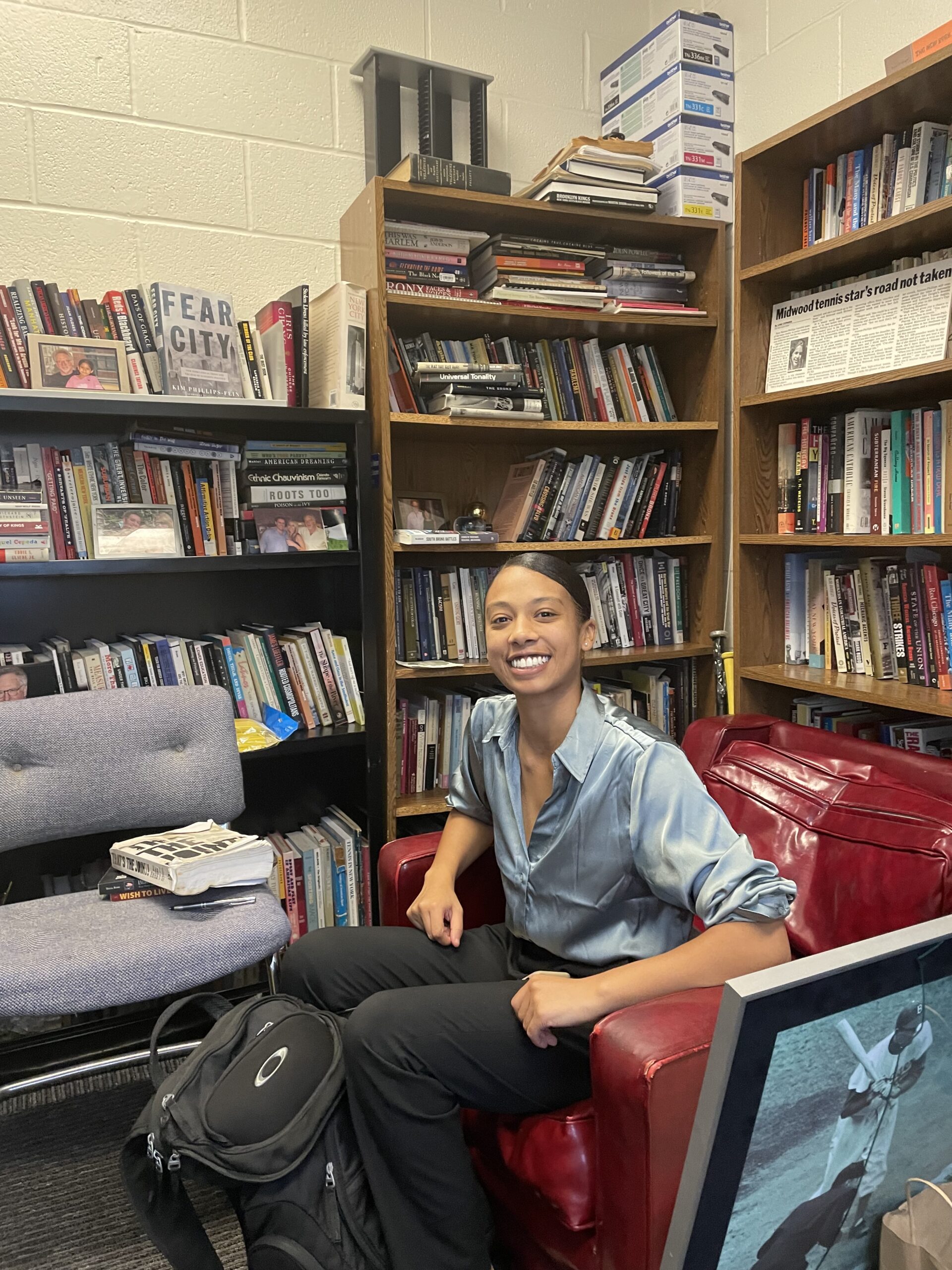
By Kate Caperan
Diana Marino is an English PhD student at Fordham University. She is also a hip hop scholar who believes that hip hop culture and music should be incorporated into high school and college curriculum. In a sit down interview, Marino revealed her complex journey with hip hop, her experiences learning and teaching hip hop pedagogy, and how she hopes this culture can enhance people’s lives in practice, appreciation, and education.
Growing up in the birthplace of hip hop, the South Bronx, it was natural for Marino to be exposed to various elements of hip hop culture. She frequently saw people in her neighborhood freestyling outside of bodegas and street corners as she would go about her daily routine. Even though she was surrounded by the elements of hip hop, Marino initially separated herself from the culture.
For most of her childhood and teenage years, Marino was steered away from hip hop culture by her parents. “Quita esa porquería;” “take that crap off,” her mother insisted whenever she heard rap music. Marino’s parents sheltered her from rap music and instilled a belief in Marino that her participation in rap music and hip hop culture would lead to consequences.
“As a kid I would think, oh, if I listen to hip hop music then I’m gonna get in trouble and get arrested like the young kids I saw getting arrested by cops, especially during the time of stop-and-frisk,” said Marino.
In the 2000s and early 2010s, stop-and-frisk reached its peak in New York City. During stop-and-frisk interrogations, the New York City Police Department “allowed police officers to stop, interrogate and search New York City citizens on the sole basis of “reasonable suspicion.” Although stop-and-frisk numbers have decreased in recent years, predominately Black and Brown communities like the Bronx remain overwhelmingly affected by these interrogations.
So Marino steered clear of hip hop culture and rap music, appeasing her parents’ wishes while also upholding her personal belief that avoiding hip hop would keep her safe from harm.
But after Marino attended a semester-long high school program her junior year, her relationship with hip hop culture completely transformed. During this program, Marino attended a predominately white private school in Vermont. Marino felt incredibly alienated by her peers at this school, experiencing major culture shock at this small PWI, especially when rap music became involved in the mix.
Marino described instances where white students would sing along to rap songs, rapping racial slurs and spewing lyrical content without “knowing the struggles behind [the lyrics].” Marino decided that when she returned home to the South Bronx after this program, she would finally embrace hip hop culture, starting with the element of freestyling.
Marino started freestyling at her Bronx high school. She freestyled with students, particularly with her male peers, in her high school’s cafeteria. Marino described much of her early freestyle experiences as “roast sessions,” where those involved in the roast would poke fun, or roast each other, utilizing clever rhymes and stingingly targeted digs.
If you aren’t familiar with roasts (which I’m assuming, is highly unlikely), the iconic Supa Hot Fire (OHHHHH) pictured below should spark your memory.

Marino’s passion for hip hop culture continued throughout her college years. Attending university in rural Indiana, Marino discovered midwest rap artists like Chance the Rapper and Noname, some of her greatest inspirations to this day.
She also continued freestyling, this time at kickbacks. These freestyle sessions were different from high school. At this rural predominately white institution, Marino’s friends were of different races, gender identities, and socioeconomic backgrounds. In college, she described freestyling as a way to find unity amongst the differences in her friends and peers, while of course also having a good time.
Marino also embraced hip hop culture in her studies. One class in particular has stayed with Marino throughout her academic career and in her personal life, “Religion and Culture in Hip Hop,” with Professor James Logan. James Logan is a PhD Professor of Religion and African American Studies, and like Marino, he is also from the Bronx.
Logan incorporated hip hop culture into his teaching through the utilization of hip hop pedagogy. Hip hop pedagogy is defined as “the authentic and practical incorporation of hip hop’s creative elements and sensibilities into teaching and learning.” With Professor Logan, Marino learned for the first time that hip hop could be incorporated into academic curriculum, and as Marino puts it, “that hip hop didn’t have to be what people perceived it as; as something derogatory.”
“There’s actually fundamental art and beauty within the art form and scholarship itself. And it’s so beautiful,” said Marino.
Inspired by Professor Logan, Marino discovered that she herself wanted to become a teacher and implement hip hop pedagogy into her teaching style.
After finishing her undergraduate studies in 2019, Marino started teaching at the rural Vermont school where she spent a high school semester, the same school where she felt alienated and disconnected from her classmates and from the South Bronx. At this school, Marino was ready to be there for the few students of color enrolled, acting as a resource she did not have when she attended.
As the youngest and newest staff member, Marino began fighting for more inclusive race-based curriculum, which was not an easy battle. Marino ended up volunteering her time every Saturday to hold a seminar class where she would incorporate hip hop pedagogy into her teaching. Marino’s seminar was so sought after that the entire student body, which consisted of 45 students, ended up attending.
During the height of the Black Lives Matter protests after the murder of George Floyd, the Vermont school student body held a strike, demanding the incorporation of Marino’s class into the school’s official academic curriculum. The students were successful, and by the class’s second semester in session, it was an official high school class. Marino became the Vermont school’s first African and African American Studies teacher. Moreover, Marino no longer had to come in on Saturdays. Her course was now held three times a week: on Mondays, Wednesdays, and Fridays.
Currently, Marino is working to get her PhD in English at Fordham University, studying to become a professor. Marino hopes to reshape and expand Fordham’s English curriculum, incorporating hip hop pedagogy into her teachings, just as she had learned in college and just as she had implemented into the curriculum at the Vermont school.
Marino was able to put these teachings to work at Fordham when she guest lectured in Dr. Mark Naison’s Bronx class earlier this semester. During her lesson, Marino delved into hip hop pedagogy and even got some members of the class to freestyle.
“Once you have a conversation about uncomfortable topics [using] freestyle, you also talk about and discover the disparities that a lot of people have to go through. Freestyle is all about the struggle and talking about your life and the struggle,” said Marino.
Marino described Naison’s class as a way for students from all different backgrounds to creatively share their opinions and life experiences. Through freestyling, topics ranging from food to religion, privilege, and struggle were covered in the class.
Marino views hip hop culture and pedagogy as tools to allow anyone to be authentic to themselves and to others. From this shared authenticity, Marino believes it will be easier for people from different backgrounds to connect, allowing for a much more impactful discussion when speaking on topics of race in and out of the classroom. As a future English professor, Marino is ready to begin intersecting rap and poetry into the English Department, creating a space for hip hop pedagogy at Fordham. Hopefully in the near future, Fordham students will be able to take a course with Professor Marino.




Thanks for sharing this very interesting story.